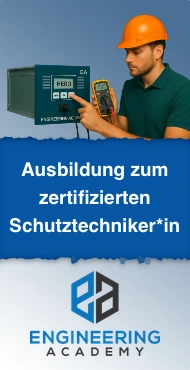EARTfelt Greetings, Dear friends of protection and control engineering! The networking of our readers, i.e. the networking of developers, engineers, suppliers, operators, sellers, programmers, students and young and old is the most important thing, a strong network is the basis of mutual success. That's why we launched our new series "10 questions for ...". From now on, we will gradually introduce the driving forces of the protection and control engineering world.
We start with our first contribution to this brand new series with Thomas Schossig from Omicron. Many already know him, but by no means all, most certainly as a co-author of the standard work "Netzschutztechnik".
Let's get started:

Schossig, Thomas
His professional career began in 1998 at VA TECH SAT GmbH in Waltershausen, initially as a project engineer for control technology projects, then as a group leader in protection technology. Since 2006 he has been working as Product Manager at OMICRON electronics GmbH in Klaus (Austria). In Business Development Power Utility Communication, he deals with test solutions for IEC 61850.
He is the author of various publications in the field of communication in switchgear and protection testing technology and member of standardization groups.
Contact: thomas.schossig@omicronenergy.com
10 questions for: Thomas Schossig
1. When and where were you born?
1970 in Gotha in Thuringia. The city was then located in a small country called GDR whose system & government thought it's possible to be for all time able to control people, opinions, thoughts and biographies.
Then it was very different very quickly. Amazing for me and a very formative experience. The collapse came at the right time to have experienced a largely funny GDR childhood and youth aware and to be able to complete a very good vocational training as an electrician with a high school diploma in Falkenberg. But in time to save me lifetime killers like the "Nationale Volksarmee" (the National People's Army). Without this change, I would not have had the opportunities I had and would not be where I am today - traveling around the world and working in Austria.
2. Why did you become an engineer?
There is the legend that to me a technical book has fallen on my head as a child. I grew up in a protection engineer household, my father was a relay engineer at the "Erfurter Energiekombinat" and is retired today, still one of the very active, chronicler and knowledge carrier in the industry, that certainly explains many things.
Therefore training and studies were almost inevitable ... Working groups at the "Station of Young Technicians and Natural Scientists" (yes, that was its actual name) paved the way to electronics / electrical engineering.
3. Which university did you go to?
In contrast to the planning of the system, I then studied electrical energy engineering in Thuringia from 1992 at the TU Ilmenau.
4. How did you come to the protection and control technology
In order to do something different than my father, I started with the control technology during my studies at the then SAT in Waltershausen instead of protection technology. The research and development department of the "Erfurter Energiekombinat" was the core of the SAT team in the new federal states and these were my old colleagues. So I started as a project engineer. Standing on the corridor at the wrong time, I ended up of 16.7 Hz technology and made long control projects for the company "Deutsche Bahn". A very good and very instructive time. Later I took over the team "protection engineering" and round up again working in the field of protection.
5. What was your biggest personal success at work?
Always having done something that was recognized and in which I could evolve.
6. In retrospect, would you do things differently?
No, not really.
7. Where do you see the protection and control engineering in 2027?
IEC 61850 will prevail, with or without Sampled Values I dare not to say. Protection and control technology run as apps on central hardware or individual devices. Communication is becoming increasingly important. Hopefully here will be a lot of testing technology in use, like OMICRON.
8. What is your life motto?
Be nice to everyone- you meet several times.
9. What can you give or advise to other engineers?
Don't be afraid of new technology or alternative approaches. "We've always done that" is not an argument. Be glad that you are in this industry - the density of pleasant people is surprisingly high.
10. Have we forgotten an important question that we should have asked you?
Nope, not really.
Many thanks to Thomas Schossig ;-)





















